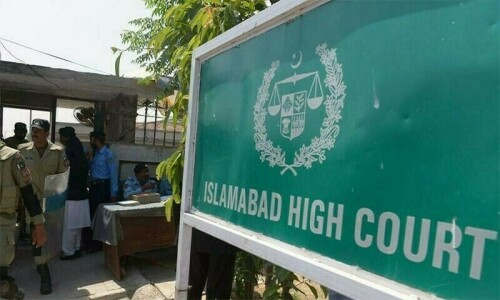ISLAMABAD: Use of derogatory remarks and language for differently-abled people on social media has been continuously increasing and hurting their sentiments.
Belittling words like “blind”, “deaf”, “crippled and handicapped” not only hurt the feelings of persons living with disabilities but also damage their inherent dignity.
These observations were made by Potohar Mental Health Association (PMHA), a non-governmental organisation. The association has expressed concern over the rise in derogatory language for persons living with disabilities and strongly condemned its usage on various media platforms.
Instead of bringing positive change into the lives of persons living with disabilities, they are objectified by being called different names. The most labels are used to settle scores, a statement issued by PMHA stated.
Farah Zulqurnain, project director (PMHA) said persons living with disabilities face several challenges in their lives due to theologies and stereotypes.
“The community of persons living with disabilities is already marginalised, barren of their rights and prospects. Use of derogatory language is a reflection of victimisation of persons living with disabilities which not only increase their marginalisation but also aggravates their social and economic exclusion,” she said.
“Belittling words like blind, deaf, crippled and handicap not only hurt the feelings of persons living with disabilities but also damage their inherent dignity,” she said.
“Persons living with disabilities do not have enough space to express their views about how they should be represented in electronic, print and social media; they are not objects of shame nor are they superheroes of a fantasy world. First and foremost, they should be treated as human beings,” she said.
In 2018, Lahore High Court (LHC) had expelled the practice of politically incorrect language like blind (andha), hearing impaired (goongha / behra) and physically impaired (langra) in official matters and directed the government to make essential modifications in the Disabled Persons (Employment and Rehabilitation) Ordinance of 1981; the decision emphasised the use of “person-centered language”.
Furthermore, it had also been recognised that “discrimination against any person on the basis of disability is a violation of the inherent dignity and worth of a person”.
“The honourable Supreme Court of Pakistan had issued directions to federal government and the provincial governments, to stop using the derogatory words such as ‘disabled’, ‘physically handicapped’ and ‘mentally retarded’ in all official correspondence, directives, notifications and circulars. Phrases like ‘persons with disabilities’ or ‘persons with different abilities’ must be adopted instead.
“Person-centered approach should be acquired. This monumental decision is welcomed by the civil society at large and persons living with disabilities in particular,” she said.
Print, electronic and social media platforms can play a vital role in educating mindfulness, defying humiliation and misrepresentation. It can be an influential source to transform the societal misinterpretations, she said, adding: “Capacity building programmes, disability sensitisation trainings, seminars should be initiated and encouraged that could disintegrate disagreeable labels and uphold the civil liberties and self-respect of persons living with disabilities,” she said.
Talking to Dawn, she said that recently a prominent personality in a tweet, while criticising an opponent, stated that “When the blind lead the blind, this happens”.
“I do not want to go in any controversy by mentioning the name of the personality but I appeal to masses to avoid using such statements,” she said.
Published in Dawn, September 4th, 2022












































Dear visitor, the comments section is undergoing an overhaul and will return soon.